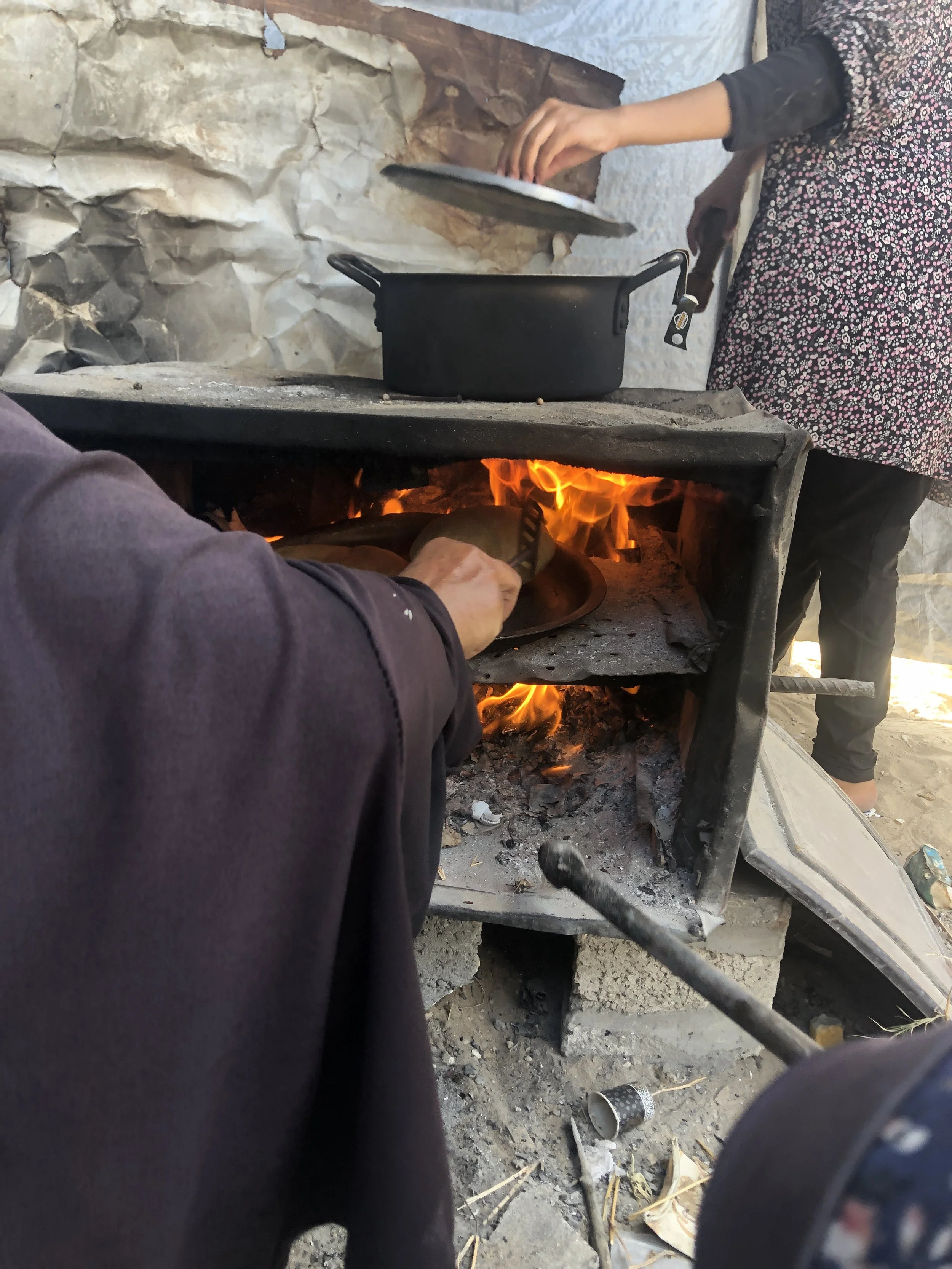Umm Muhammad’s Recipe for Survival in Gaza
Umm Mohammed and her daughter make bread with their secret ingredients in the Al Sheikh Radwan neighborhood of Gaza City, June 4, 2025. Photo Credit: Abood Al Skafi
In a small, makeshift kitchen in southern Gaza, Umm Muhammad Taher stands over a pot of bubbling water, soaking pasta—not as a side dish, but as a secret ingredient to stretch a dwindling supply of flour. With Gaza under siege and the Israeli occupation choking off food supplies, especially flour, Umm Muhammad has become an innovator of necessity, a chef of resistance.
“I had to do something,” she says, gently stirring the softened pasta. “A bag of flour is now a treasure, and every grain counts. I mash the soaked pasta with hot water, salt, and a small amount of flour." Then she prepares flatbread on a metal sheet laid on wood. "It smells of hope."
Before the siege worsened, Umm Muhammad would bake bread daily. Now, one bag of flour must last her family of seven for over three weeks or more.
In Gaza, even the sound of dough rising has become a whisper of survival. The price of a 25-kilogram sack of flour has surged from 40 shekels ($11 USD) to 1,500 shekels ($430 USD)—if it can even be found. Most of what is available is old, musty, and smells of damp storage. To stretch every crumb, Umm Muhammad found herself inventing bread from almost nothing. She soaks pasta in water until soft, then blends it with flour—one kilo of flour, one kilo of pasta. The result isn’t perfect, but it’s sustenance.
Then, in June 2025, Umm Muhammad had to make the most difficult decision of her life: to sell her gold bracelet to buy a single sack of flour. The bracelet wasn't just jewelry, it was her wedding gift. But hunger has no regard for hope or nostalgia. With that sack, she started baking a new type of bread, one that yields 13 loaves each day using the flour-pasta combination. Her fingertips, damaged from the heat and kneading, now feel the weight of desperation in each batch.
Her husband, Abu Muhammad, now limps about the house ever since an Israeli airstrike dropped shrapnel into his back, causing him severe anguish and preventing him from working. He watches his wife carry what he no longer can as his silence shouts louder than any scream ever could. Despair and helplessness show no mercy sometimes.
Initially, the children disliked the new bread. It was chewy and odd, unlike before. But hunger is a harsh teacher. Umm Muhammad claims it dries rapidly and becomes stiff within hours, but her children have learnt to eat swiftly and, with time, without complaint. Sometimes her youngest tucks a bit under his shirt, murmuring, “For tomorrow, Mama, in case there is none.”
She gives each of her five children one and a half loaves a day. To make it last, she combines lunch and dinner into one meal, served late to delay hunger. With luck, a sack of flour lasts 20 days—but beyond that, she doesn’t know what to do. No aid is allowed in, and the siege tightens like a fist.
Yet Umm Muhammad holds on. When she kneads dough, she murmurs 'bismillah'—not just for blessing, but as defiance. She will not let her children starve quietly. Not today.
“At first, I cried when I realized how little we had,” she says. “But then I started soaking pasta, mashing it, and mixing it with flour. It’s not perfect, but it fills the stomach.”
She also incorporates rice into the dough, avoids using oil and adds thickness with lentils pounded into powder. Breakfast is skipped. Tea with sugar is now a luxury, while lunch is frequently the only real meal.
"Some days, we boil rice with a little salt. That is it. Umm Muhammad told me, “But I tell my kids, ‘This is resistance food.'”
Since March 2, no aid trucks have come. Flour costs have increased beyond affordability. What used to cost 100 shekels now costs more than 1000—if it's even available.
"We wait for rumors about aid like it's a weather forecast," she tells me. "Sometimes you hear there is flour in a nearby center. You run there. Nothing.”
The lines for food are long and embarrassing. She avoids them whenever she can, preferring to maintain her dignity even if it means going hungry.
Neighbors beg her for recipes. She has taught other women how to minimize portion sizes, reuse rice water, and ground chickpeas for texture.
"One woman said to me, 'I didn't realize you could do that with macaroni! I laughed. "It's no longer food; it's strategy."
Her voice falters when she talks about her children. "I can tolerate hunger. But when my 5-year-old says, 'Why can't we eat bread like before?' "I feel like I failed." Despite everything, she keeps her spirit—because giving up is not an option. "Every meal I prepare, no matter how tiny, is confirmation that we are still here. I whisper 'bismillah' not as a blessing, but as a declaration: we are alive."
Palestinian food is rich and soulful, yet under siege, it disappears dish after dish. "I haven't made maqluba or stuffed grape leaves in months," Umm Muhammad says, sighing. "I miss za'atar and olive oil. "I miss baking with my girls.
Eid faded away like a shadow. No sweets, no gatherings, just a lamp and a few dates. "We feasted on a few dates.”
Nonetheless, her community remains intact—neighbors share a cup of flour, a smile, or even a half-loaf. "The occupation takes food, but not love," she explains.
"I want people to understand that we are not statistics. I'm a mother. I'm a cook. I am a lady who will not let hunger quiet her children. What if the siege ended tomorrow? I would bake bread with my girls. Real bread. I would add thyme and olive oil. And I would eat slowly, gratefully, knowing I survived.”
Her flour may be running low, but her strength rises—like dough left to rise in the heat of Gaza’s sun. Umm Muhammad reminds us that, amidst the holocaust of our time, survival is not passive but a stubborn and creative show of resilience and defiance.
Subscribe to the Palestine Nexus newsletter:


